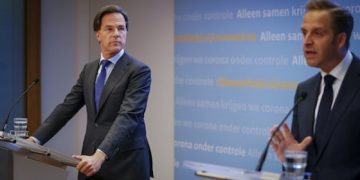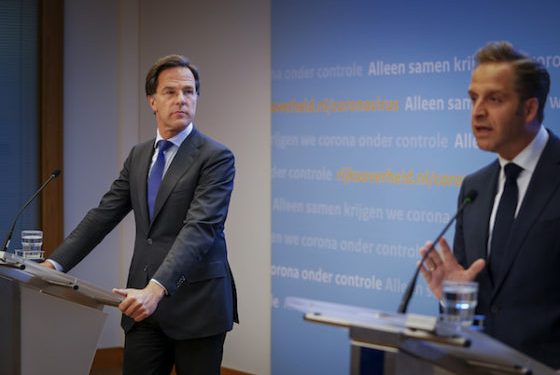The Dutch government outlined its road map to ease the coronavirus restrictions on Wednesday, with prime minister Mark Rutte saying there is room to relax some of the rules as long as hospitals are not overloaded and the elderly and people in poor health remain protected.
The message, the prime minister said, is switching from ‘stay home as much as possible’ to ‘stay home if you have symptoms’, but the 1.5 metre rule will remain and people are encouraged to work from home as much as possible and avoid busy places.
Hairdressers and other professions can restart operations from May 11, cafes and restaurants will be able to open from June 1 – within limits – and face masks will also be compulsory on public transport from that date. The next steps are to help the economy as well as to give everyone in the country the space to look forward and make plans, Rutte said. ‘We will have to live with the virus for a longer period – the new normal – while we wait for the development of a vaccine,’ health minister Hugo de Jonge said. ‘The three aims remain to protect the vulnerable, make sure the health service does not become overloaded and to get greater insight into the way the virus spreads. This means we can steer it more accurately.’
Testing is also being stepped up to include more categories, with police and public transport workers being added to the list mid May. By June, De Jonge said, everyone who is showing symptoms of coronavirus will be able to be tested. Testing will also be followed by an intensive tracking programme organized by local health boards so that ‘we can put out the flame, wherever it flares up,’ De Jonge said.
Currently fewer than 10% of tests are showing up positive, the minister said. Asked why face masks are now being made compulsory on public transport, the prime minister said that government advisors say there is some evidence that the correct use of masks can be useful in situations in which social distancing is not possible. ‘Their use is not primarily to protect yourself but to protect others,’ Rutte said.
The government, he said, is also in talks with employers groups and other organisations to look at ways to reorganize working hours to better spread passengers across public transport. ‘There will be problems which arise which we have not taken into account, but it is possible to come to practical solutions, and we have shown we can do that in the past few weeks,’ Rutte said.
The deadlines:
May 11: The message will switch from ‘stay at home as much as possible’ to ‘stay at home if you have symptoms’, but the 1.5 metre rule will remain and people are encouraged to work at home if possible. Experiments with allowing visits to nursing homes will also start up, involving one home in each of the 25 local health board areas. Two weeks later, visits will be increased if the experiment is successful. Hair salons, beauticians and nail bars and the like can open again on condition they work by appointment only and as long as they check with clients in advance that they have no symptoms. Face masks are not compulsory but chairs must be 1.5 metres from each other. Indoor swimming pools will reopen, with social distancing restrictions. The over-18s can resume outdoor sports which do not involve physical contact, such as tennis and golf, can resume but competitions are not allowed. Groups of up to 10 can take part in outdoor sports together as long as there is no contact. Libraries can reopen, as long as they bring in measures to enforce the 1.5 metre rule. As announced earlier, primary schools and daycare centres will reopen. Schools must divide classes in half and the government recommends pupils attend on alternate days rather than half days in order to reduce pressure on public transport and outside space.
June 1:
Public transport will start running normal services again. Travellers must wear a ‘non-medical’ face mask and a maximum of 40% of seats may be occupied. People who don’t wear a mask can be fined. The size of the fine still has to be worked out. Secondary schools will reopen and the exact details still have to be worked out. Cafe and restaurant terraces can reopen as long as everyone sits at a table and there is 1.5 metres between tables. Restaurants, concert halls theatres and cinemas can reopen for a maximum of 30 people including staff, seated 1.5 metres apart and by reservation only. Museums can reopen on condition tickets are sold in advance and the 1.5 metre rule is maintained.
July 1
Campsites and holiday parks can reopen completely, including communal washrooms and toilet facilities. Restaurants, theatres and cinemas can scale up to a maximum of 100 people, seated 1.5 metres apart and by reservation only. Churches, mosques, crematoria and congress centres can also open for up to 100 people.
July 15
Practical exams and lessons to resume at trade schools.
September 1
The ban on festivals and large organized events is due to be lifted but the government has pledged to give an update prior to the deadline. Saunas, sex clubs, casinos and sports clubs can reopen and contact sports will also be permitted. The government is looking into the option of reopening sports clubs and gyms earlier, if solutions can be found to specific problems.
Foreign travel
Travel abroad is currently restricted to essential travel only and any easing here will depend on other countries as well, Rutte said. All the measures depend on a continued reduction in the infection rate and each measure will be given final approval a week before the deadline.


















